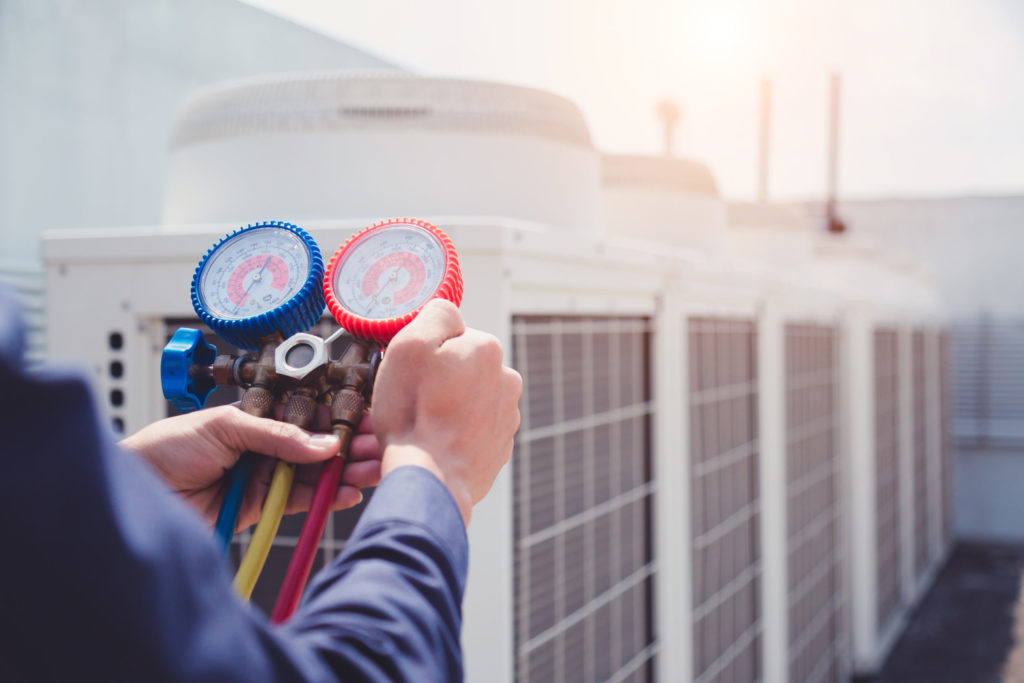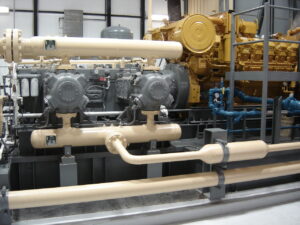Cooling systems are often a requirement for the clients whom we serve. The process can range from using the chilling process to keep a mold from overheating in a plastic-injected manufacturing operation to making sure ingredients don’t spoil during food production, or even ensuring critical medical equipment is kept online. Whatever the reason may be, cooling systems are at the heart of many operations for our clients because of the role it plays in ensuring the functionality of their processes and equipment. While cooling systems are vital to the operations of the company, the decision of which cooling system is ideal is equally as important in order to ensure that the equipment doesn’t “lose its cool.”
Dry Fluid Cooling System
Dry fluid cooling systems perform a thermal exchange by pulling in external air and circulating it over tubes containing a cooling fluid, typically water. The fluid that is cooled circulates through a heat exchanger. The excess heat transferred to the cooling fluid is then returned to the dry cooler and the cycle repeats. The unique feature about a dry fluid cooling system is that it does not have a refrigeration unit but, instead, leverages fans to use the ambient air it pulls in to cool the hot fluid.
Dry cooling systems are a dual unit system that uses outdoor and indoor elements that are then combined to the pump. The outdoor component is the actual dry cooler. As for the indoor unit, it is made up of a heat exchanger, pipes, an evaporator, and a compressor.
Dry fluid cooling systems are easy to install and get going immediately, as well as having lower operating costs. They not only can operate year-round, even in colder temperatures, but they also do not require constant water for the process, eliminating any concerns about supplying water or disposing of contaminated water. This does require extensive monitoring, however, in order to ensure the fluid levels for the cooling process do not drop below the preferable levels.
Open Tower Cooling Systems
Unlike the dry fluid systems, open tower cooling systems remove heat from a system due to the evaporation of water. There are really two types of open tower evaporative cooling systems: direct and indirect.
Direct evaporative cooling systems put the water into direct contact with air, hence the name. The water flows through and as a fan draws air to flow across the water, it facilitates a transfer of heat from the warm water to the cooler air that is being pulled in. The increase in the humidity of the air is caused by the evaporation of the water, causing warm dry air to be changed to cool, moist air. The moist air must be released outside on a continuous basis or the air will become oversaturated and the evaporation will stop.
Indirect evaporative cooling operates in a total opposite manner. In this format, it uses direct evaporative cooling, as well as garnering assistance from a heat exchanger of some sort, to transfer the energy. In this process, the cooled moist air never comes into contact with the conditioned supply air. The moist air stream is released outside or used to cool other external devices. This is a great process for enclosed spaces, as this helps avoid excess humidity.
Process Chillers
Industrial process chillers are used for controlled cooling of products, mechanisms and machinery in a variety of industries. Chilled water is used in a wide range of applications to cool or cure anything. These process chillers remove heat from the process water and transfer it to air via a heat exchanger.
Process chillers draw water from a tank and pump it through the chiller and then back into the tank to use again. A “closed loop” system increases efficiency and lengthens the life cycle of the equipment, as it recirculates clean water with condition additives at a constant temperature and pressure to increase the consistent and repeatable variables.
Process chillers improve productivity as they always maintain a consistent temperature for dependability, as well as lower production costs by eliminating waste. While operating costs are lower for these machines, the upfront costs are higher, as is replacing faulty components.
Cooling systems are vital to the operations for many businesses. At Dearing, we have over 75 years of experience and expertise making sure your cooling system is the right one for you. Let us help you and see the Dearing difference.




